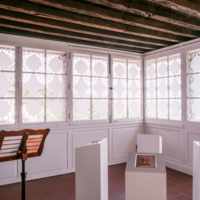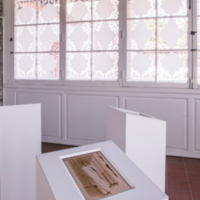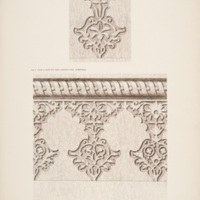Nirmal Raja
Vergence: An Orientalist Dystopia
In this era of “post-truth” we are now given license to choose what we believe and disbelieve. Truth is now relative, and we are compelled to exist in multifaceted alternate realities. If this is the case, can we examine the archive with the same dystopic lens?
Nirmal Raja has spent the last few months delving into various materials at the UWM Libraries with a focus on orientalist representations of South Asia. In this installation she brings together a selection of materials from Special Collections and The American Geographical Society Library (AGSL), and ephemera from her own personal collection, in an interactive and exploratory installation.
Raja investigates how early perceptions of South Asia formed, and urges viewers to form their own connections to the present. Most often, the West has seen Asia as either exotic and beautiful or dangerous and perverse. These perceptions continue to inform our present day understanding of this region and people. Raja gives the audience an opportunity to approach these materials with fresh eyes, reframed by the screen that surrounds the sleeping porch.
The “Jaali” or decorative screen has long been used as a device for segregating genders and spaces in South Asian culture. Using this structure as a trope, she surrounds the viewer with a deceptively decorative screen inscribed with a listing of ongoing hate crimes against South Asian Americans sourced from the South Asian Americans Leading Together (SAALT) website. She asks the viewers to exercise “vergence”- an ophthalmic term that refers to the focus and alignment of eye movements. The viewers have the choice to focus on this list or look through the screen towards the blue lake and ignore the violence that is happening around them. By giving the audience agency to make their own connections and come to their own conclusions, Raja hopes to bring attention to how our perceptions of the “other” have been mediated historically and how we make choices that unconsciously or consciously reflect bias and apathy.





